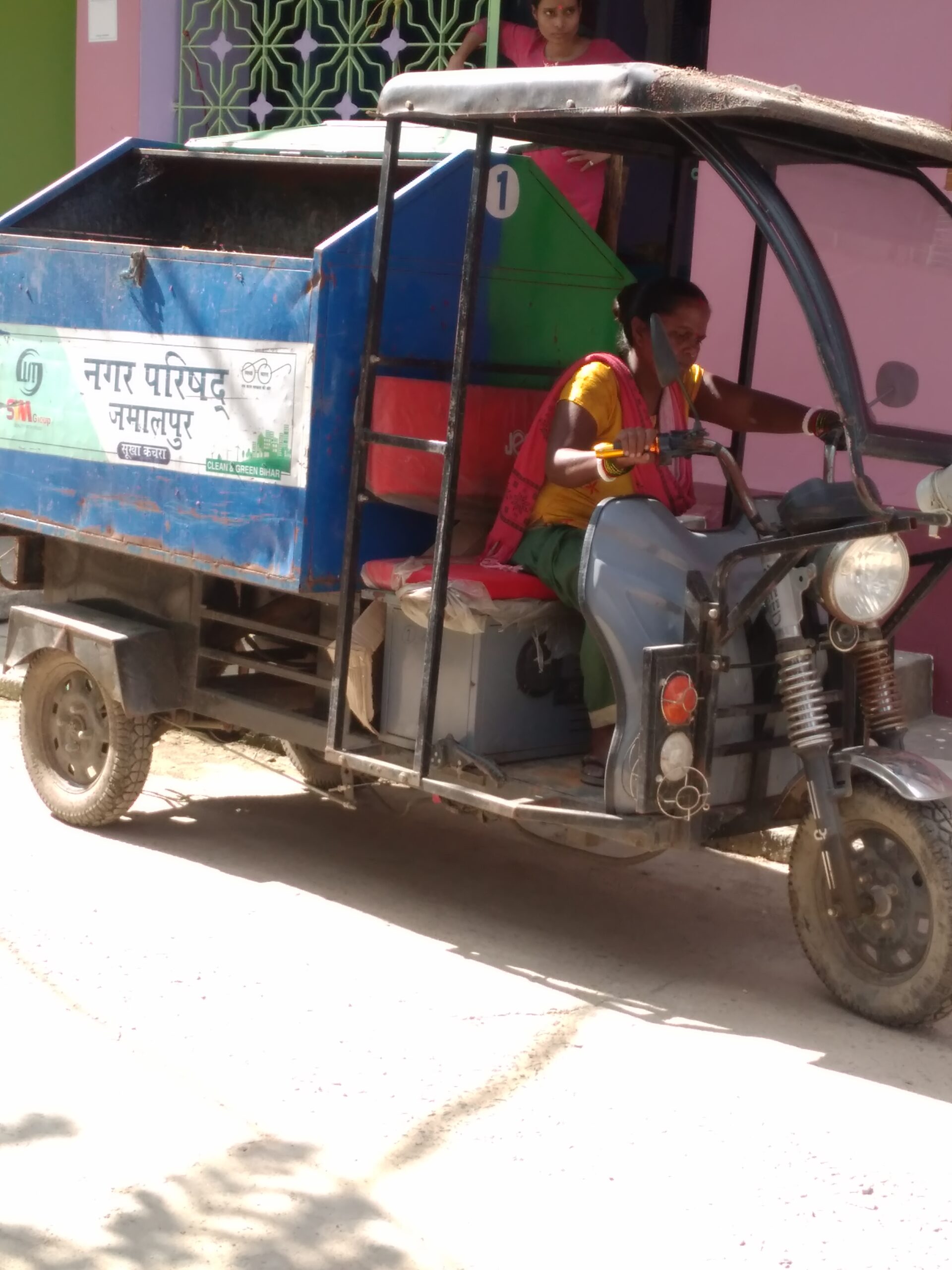


Local Municipality Hires Women For Waste Collection, Blazes New Trail Of Empowerment
A saree-clad woman driving an electric garbage collection vehicle on the streets of Jamalpur, a city in Bihar state of India, makes for an usual picture. The woman, Mala Devi, firmly holding the steering of the e-vehicle locally called the `Toto’, stops outside homes as women hand her their domestic waste. For elderly and infirm women, Mala Devi steps out and collects the garbage herself earning blessings. She ensures that dry waste and wet waste is segregated at source and put in different sections of the vehicle.
From 7 am to 2 pm, Mala Devi collects waste from some 400-500 homes in the city. The work has fetched much recognition for Mala Devi who locals fondly refer as `Toto wali behan’ (sister driving Toto) and earns her a decent Rs 9,500-10,000 per month. This money helps this mother of two children make up for the financial loss on days when her daily wage husband does not get work.
Mala Devi, a member of Self Employed Women’s Association (SEWA) Bihar is one of the seven women hired by the Jamalpur Municipal Corporation (JMC) for door-to-door waste collection in the city which was formed as a railway settlement in 1862 and boasts of large locomotive workshops.
“Initially I was apprehensive if I could learn driving at 40 years of age. But then I decided to give myself a chance. After a jittery few days, I have learnt to take control of the vehicle. Once you get comfortable in the driver’s seat, it is easy,” says Mala Devi, who took up the challenge to learn driving the automated vehicle at 40 years of age. She underwent 20-day training arranged by the local body after which she was inducted as waste-collector on e-wheels.
HOW MALA DEVI STARTED DRIVING E-GARBAGE VAN
Mala Devi was approached by JMC officials at one of the meetings of SEWA as she was known for her leadership skills and perseverance. By one stroke, the local body has changed the fortune of these resilient women. Before this, Mala Devi used to work as a domestic maid in two to three houses. She would earn Rs 5000-odd salary but she yearned to do something which would fetch her social respect.
“This is good work for a woman. It earns a decent income and gives a sense of freedom and empowerment as well,” says Mala Devi.
MALA DEVI’S JOURNEY WITH SEWA & HER GROWTH STORY
Mala Devi joined SEWA in 2016 when she learnt of the organization’s work for the informal workforce in the state. As a member of SEWA, she participated in various meetings and capacity development training sessions including leadership workshops which honed her skills and instilled confidence in her.
Through SEWA, Mala Devi learnt about microfinance and took part in SKS Microfinance meetings, many of which are now hosted in her house. Life was running smoothly for Mala Devi till Covid-19 pandemic struck and suddenly she found herself without work as families chose not to allow domestic help home for fear of infection. Her husband’s health also deteriorated rendering her the sole breadwinner of the family. Mala Devi did not give up and in 2021, she was elevated as SEWA aagewan (leader) thanks to her dedication and eagerness to learn new skills and help other women.
INDIAN CITIES REELING UNDER MOUNDS OF NON-SEGREGATED WASTE CAN DO WITH MORE MALA DEVIS
Mala Devi and SEWA believe that if more women are recruited and trained by urban local bodies in the country in mobile waste collection, it can result in twin victories– a clean city and more empowered women. Most of the Indian cities are battling with the problem of growing mountains of non-segregated waste as urban bodies struggle with segregated waste collection at source.
SEWA leaders say that there are a million waste-pickers in India of which 80% are women. Many of these women are second or third generation waste recyclers. “Waste collection is getting more and more privatised in cities and towns due to which women waste recyclers are getting thrown out of their traditional work. Jamalpur Municipal Corporation’s initiative to train women in driving and recruit them for door-to-door waste collection can serve as a successful example that can be replicated in other cities to give more work power to women, especially those who are already engaged in waste recycling,” said SEWA leaders.